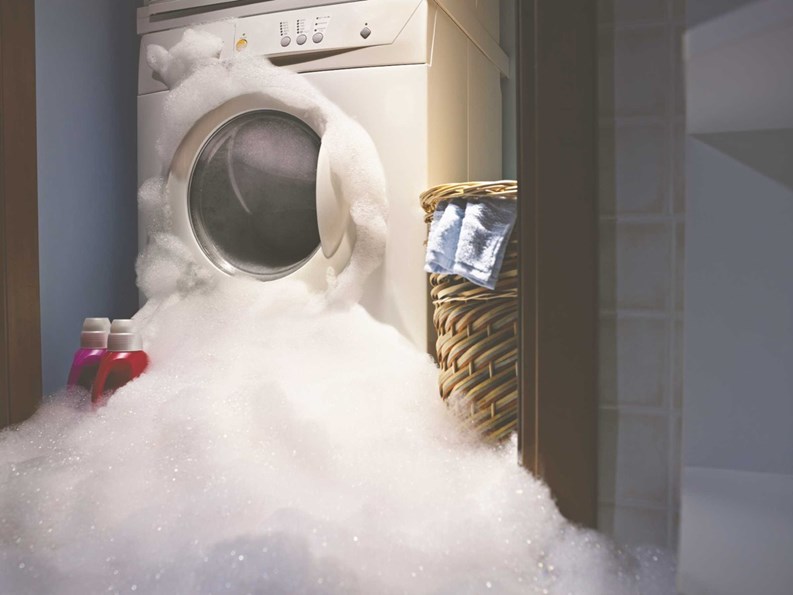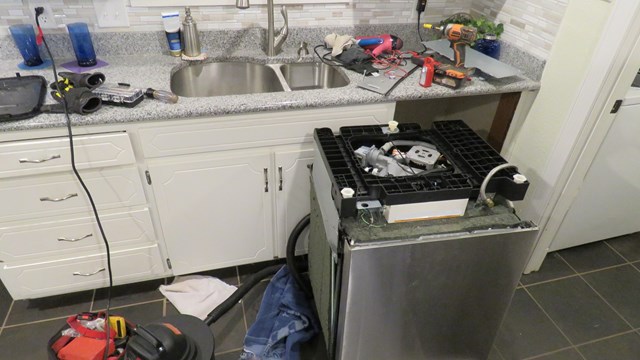In an online forum, Sharon complains about her upstairs neighbor and begs for advice. Her neighbor had installed a washing machine in her unit, even though there was one already downstairs for the residents of her six-unit building to use. As a result of the neighbor’s improper installation, her appliance overflowed, resulting in a flood of water that came pouring into Sharon’s unit through heating and air vents. Now, Sharon’s wall-to-wall carpeting is ruined and she’s concerned about mold and other damage.
Amenities, Amenities, Amenities
Prior to the housing collapse of 2008, condo buyers sought out brand-name, high-end appliances such as Bosch and GE Monogram. Today's buyers however are more educated than ever and they know that an expensive refrigerator or range is only as good as the unit itself. According to many brokers, buyers are even more picky, and this pickiness is due not only to the recession, but to the massive amount of litigation that have hit condos in recent years. Condo developer Shaya Boymelgreen, who built more than 2,400 units during the real estate boon ended up having to defend some 30 lawsuits from buyers complaining of poor construction.
Today's buyers are educated, well versed in these lawsuits and are now paying close attention to features like plumbing, insulation, electrical and flooring.
While having certain appliances, such as washing machines, dryers, dishwashers and trash compactors, in the units is a very attractive feature for condo or homeowner association residents, these conveniences do occasionally cause leaks, noise and vibration issues between residents, and can also create a major fire risk. There are definitely pros and cons to having in-unit amenities.
“On one hand it provides a convenience to the resident, because they don’t have to go to the common laundry room and share the machines,” says Kenneth M. Lovett, president of John B. Lovett & Associates, Ltd., a management firm in College Point. “On the other hand, these appliances can cause suds to back up in the line, cause bubbles to appear in the toilet or sink of a lower floor, and cause floods. And, for dishwashers, having them vented out of the window is just not attractive.”
Steven Troup, a partner at the law firm of Tarter Krinsky & Drogin, LLP in Manhattan, says that prior to 1985 it was rare to have washers and dryers in a high-rise Manhattan apartment. “However, in the outer boroughs where there are garden style apartments, they are more common. In 1985, the first big construction era where buildings were built as condos, it was normal for the washer and dryer to be in the unit, but because the older buildings are co-op there are plumbing and space issues and most weren’t constructed to accommodate washing machines.”
Peter Lehr, director of management for Kaled Management, with offices in Long Island and in New York City, says that his management company prefers a common laundry room for their residents. “We do manage locations that allow for the washer and dryer to be in the unit, but you’ll get a resident who sneaks it in when they shouldn’t.”
That’s exactly what bothered another unit owner. He lives in a co-op and explained in an online forum how a broken pipe from a dishwasher they installed in the apartment above caused water to flow into his newly-renovated unit. The kitchen was destroyed and there was water damage in almost every room of the apartment and, he says, in almost every unit under the upstairs unit.
Dishwashers and washing machines aren’t the only potential water nuisance in the building. Although garbage disposals sound like an easy, convenient appliance, many older buildings do not allow their residents to install disposals in their units either. The device, which shreds food into smaller pieces, has been legal in New York for more than a decade, because it can cause waste buildup in the lines, which results in backups and overflows that can ultimate cause damage to the units and to the pipes. “Often the pipes are weak and the vibration from the disposal can cause pipe joints to separate,” says Troup.
Dishwashers can not only cause leaks but have also been known to be a fire hazard, due to electrical failure in the dishwasher’s heating element. That’s a scary concept considering that residents will often run their dishwashers when they are sleeping or not at home and if a fire breaks out during this time it can cause even more substantial damage.
To Ban or Not to Ban?
Today, to prevent these problems from happening, some high-rise buildings outlaw in-unit washing machines dishwashers and other appliances entirely; while others move to outlaw them but 'grandfather in' existing owners who already own these items. “If it doesn't conflict with the proprietary lease, yes they can legally ban the appliances from the units,” says Troup.
Howard Schechter, a partner at the law firm of Schechter & Brucker in New York City explains that the changes are generally done with a house rule.” Under the lease the board is given power to adopt rules and regulations and that power can include prohibiting appliances that may have an adverse effect in the building.”
But taking an amenity away from a resident who already has been enjoying its perks may not sit well with them. “People are very litigious and some people call a lawyer and will sue for anything,” says Troup.
Still others take it for granted that residents will have in-unit appliances, and make no rules about them at all. Lehr says that his management company still prefers a common laundry room for their residents. “We do manage locations that allow for the washer/dryer to be in the unit, but you’ll get a resident who sneaks it in when they shouldn’t and my concern is an overflow.”
Newly constructed buildings already include the appliances as well. “They made the pipes big enough and did whatever else they needed to do to accommodate the soapy water,” says Troup.
And if a ban is put into place, who is going to police it? “It’s up to the building staff,” says Lehr. “The staff has to be aware if they go in to the unit to make a repair or check on something. A good super should be looking around and making sure nothing is out of place. I always tell my guys when they go in to check on dripping faucets because it can save thousands of dollars and when they are looking around, look for things that don’t seem right.”
Coming to a Compromise
Schechter says that the better approach is to require that appropriate safeguards be installed on these appliances. There are systems that sound an alarm when it detects water on the floor and immediately turns off the water supply to the washing machine. It then sounds an alarm to let you know that there has been a problem. There are also alarms for when a leak has been detected.
Communicating with residents about keeping appliances in top working condition is also imperative to preventing any damage. Make sure the residents don’t try to fix appliances on their own. “I've seen times where problems arise where the residents try to fix the dishwasher by yanking it out of the wall, which can breach the gas pipe in the back of the appliance. When they call Con Ed, they come in and, can shut the whole building down. One such time it happened, the building spent around $125,000 making construction changes to get the building on again.”
When communicating with your residents, Lovett also says to be sure to spell out in any renovation agreement what is allowed and not allowed to be installed on the remodel.
“Also, if a building is going to consider letting residents add dishwashers or washing machines in their unit, they should also check the building infrastructure to make sure it’s not problematic,” he says.
Appliances will always come with some sort of a problem, but Schechter says that it shouldn’t discourage the management or board to consider adding appliances as amenities. “The board should be aware that as technology changes and new appliances become available that people find desirable, their immediate reaction shouldn’t be ‘we don’t want that.’ ”
Instead, says Schechter, the manager, the board or the owner should look into how they can protect the building and still continue to provide amenities that add both value and convenience to urban living.
Lisa Iannucci is a freelance writer and a frequent contributor to The Cooperator.










Leave a Comment